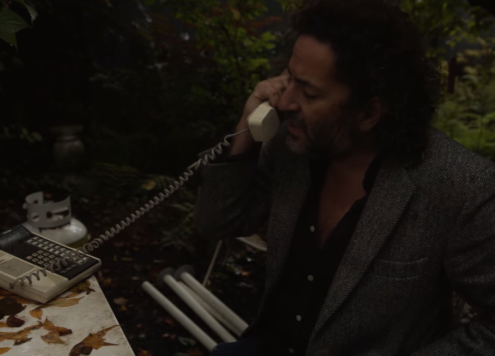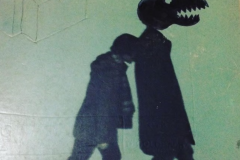For some reason, I’m excited today. There must be something in the air because I feel like I’m exploding. And no, it’s not the Meghan Trainor emails I’ve been bombarded with all week letting me know that she’s dropping an album or the final one that I received today saying “It’s here!” I just can’t put my finger on it but this week simply feels…different. Well, I never assume anyone reads the opening paragraph(s) here unless it has something to do with music but let’s begin.
I’m never fully able to throw myself entirely into my work but today is one of those days that things need to be addressed: Son Little is the future! There, I said it. Or wrote it. The Philly man who writes utilizing the moniker, Aaron Earl Livingston, has dropped a couple of solo albums and today marks his third, Aloha (ANTI-), and everything he’s done in the past has led to this moment here. He straps on his acoustic guitar and drops soulful tunes that are plentiful. I understand comparisons are cheap AF but I’m usually broke and my son always wants that G.I. Joe with the kung-fu grip. His music is soulful R&B with Hip-Hop leanings (Son Little has worked with Hezekiah, The Roots, and RJD2 in the past) but musically I’m reminded of Georgia soul/R&B artist Anthony David, not in musicality but in emotion and delivery. The songs on Aloha come from the heart, and it definitely feels that way.
A singer/songwriter of a different ilk is Walter Martin. Everyone may remember NY’s the Walkmen, who has released a handful of albums since the band’s dissolution. Martin just released a new album today entitled The World At Night (Family Jukebox) and I’m not sure how I’m supposed to feel about it. Martin’s delivery is laconic, much like that of J. Mascis although his compositions are mired in melancholia, leading me down a winding road asking anyone if they have any alcohol in their cupboards. The songs are beautifully composed, with piano arrangements, strings, and an assortment of instrumentation. If Martin failed to make me feel anything and left me devoid of emotion, we’d have a problem. In this case, it’s just the opposite. The title track has brought me down as far as I can go, which is a good thing, but then he has other songs filled with horns and happiness evoking images of the past, decades ago. Martin’s musicality is wonderous.

It’s never been a secret that Dan Bejar is a master songwriter, having recorded 13 albums under the Destroyer moniker prior to the release of Have We Met? (Merge). This doesn’t even account for the 6 albums he’s recorded as a member of The New Pornographers, or any of the other projects he’s a part of. It doesn’t matter how songs are delivered, whether they’re guitar-driven, electronic drum patterns, or mechanized synthesizers, there’s going to be something that’s interesting. And here, it’s no different.
The “Crimson Tide” keyboard washes holds much similarity to what may be a David Lynch theme song for Twin Peaks once it begins but then shifts with 80s synth-pop connotations as Bejar sings/speaks, “I was like the laziest river/a vulture predisposed to eating off floors/no wait I take that back, I was more like an ocean/stuck inside hospital corridors,” leaving us with a barrage of imagery. Yes, the song is mechanically driven BUT, I did mention that Bejar is a master songwriter correct? In the second verse, his delivery may be perceived as lazy but it’s fitting within the song’s content. Yes, I can play this song every day for the next year if I want, which I have since I first heard the song.
But the beauty in his songs aren’t always so obvious as they begin, much like “Kinda Dark” with its mechanized beat, and sturdy bassline, but as soon as Bejar sings, his cadence fills an airy room. The song generally moves at a snail’s pace until around the 2:13 mark where the drums drop in loudly, shifting the dynamics with guitars wailing, doing his bidding. Bejar is clever in his ways. Take a look at “It Just Doesn’t Happen,” which opens with the same pop-enthused synth beats and melody for the first minute before once again, shifting in dynamics, and if the song doesn’t make anyone dance, they’re dead inside. The song is perfect in that way. Destroyer gets atmospheric on “The Television Music Supervisor,” while becoming a bit morose with “The Raven” with a musical contrast. On “The Man In Black’s Blues,” Bejar offers up a bit more, allowing room for harmonies over keyboard washes and electronic beats.
If the Canadian singer/songwriter gave it all up today for a much simpler life, Have We Met? could be the album he retires with on his move to Vegas or Arizona. Settling in for weekend gig every week just sitting at a keyboard. I for one would be that patron, sitting there, humming along to his songs just as long as he’d let me.
Facebook | Twitter | Instagram
When catching up with an artist, a name can either pique the curiosity of force one to move in the opposite direction. It happens a number of times but fortunately here for this group, interest got the best of me.
With well over a decade’s worth of experience and a handful of releases under its belt, L.A.’s Dustbowl Revival has been received as a group based in Americana and Folk, but it seems there’s much more to the band than that, although the band is a self-described Roots collective. But we’ll get back to that. But my first impression to Dustbowl Revival with Is It You, Is It Me? (Thirty Tigers) has me dumbfounded that it’s taken so long to even hear of the band. The songs compiled here are instantly catchy AF, perfectly constructed, and sounds as if the band eschews standard mainstream A&R suggestions. Which is a good thing.
One almost doesn’t know where to begin here so the obvious would be its starting point with “Dreaming,” filled with horns, guitars, and what sounds like mandolin plucking. Or possibly strings as they come in later on the song. It’s the perfect opener, filled with distinctive melodies though out which leads into the next “Enemy,” with vocal duties handled this time around by Liz Beebe on the grandiose track with a bounce that’s led by underlying keyboard notes with horns and a rhythm section wrapped around as harmonies flail away alongside Beebe’s lyrical dis(content). When she sings “I could never be your enemy/ but now I just can’t be your friend / now I see you’ll be the end of me / if I don’t try to defend (myself),” you visualize her strength as shields are raised like a Spartan.
From this point on the songs, the shift in strength in songs seemingly dissipates but that’s not actually the case. The collective moves in varied directions as “Sonic Boom” builds; the crescendo takes hold following singer Zach Lupetin’s lead here allowing the airy track to build in strength with strings & horns. It’s majestic. The band changes its stride on “I Wake Up” with just guitars & vocal harmonies. It’s sweet and sensual from beginning to end while “Get Rid Of You,” hit within a midtempo range, again with vocal harmonies, stings & horns blending together as if they’re one, and here the band plays with dynamics ever so briefly.
And then there’s “Mirror.” The song is drenched with harmonies & guitar plucking, light drums, and strings as Lupetin tugs at heartstrings with his remorseful vocals, haunted by his past. Beautifully constructed within its own juxtaposition. The band then heads off into more reggae-esque directions on “Ghost” where Beebe takes the lead again here. The track moves into ska-like territory but it works for the band. Then there’s “Just One Song,” where much like “I Wake Up,” the band leaves open space around guitars and vocal harmonies although they also include sparse keyboards as well. The closing and much slower “Let It Go” follows suit but the starkness left around the track allows an ostentatious yet sublime feel to it. Don’t get me wrong, it’s perfect in every way imaginable.
While it seems the band does some genre-hopping throughout the Is It You, Is It Me? The group never loses its identity, which it holds onto tightly. It’s beautiful, it’s captivating, and I’m left in awe.
Facebook | Twitter | Instagram
It’s no surprise that Poliça has been through some shit. Well, Channy Leaneagh anyway, but that, of course, had a profound effect on the group itself. Falling off her roof and smashing one of her vertebrae back in 2018, she had to rework her body in order to find herself once again. The Minneapolis synth-pop group, which also includes Chris Bierden (bass), Drew Christopherson (drums) and Ben Ivascu (drums), were all able to work through it all to release the group’s newest and fifth album, When We Stay Alive (Memphis Industries).
While we can’t forget the previous albums, Leaneagh wrote songs from a different perspective, focusing on her inner-being. Half of the album was already recorded prior to her accident and while the finished product is obviously distinctly the vehicle for her soulful ease, the band has created an album that’s both energetic, rhythmic and takes its synth-pop sound to another level altogether. While bass & drums are the base with atmospheric tones filtered throughout as well as guitar and keyboard washes, Leaneagh’s vocals are beautifully displayed. On the opening “Driving” she utilizes her voice in a variety of ways, quietly displaying the range she’s capable of reaching.
“Little Threads” opens in repetitive motions for the first 30 seconds before Leaneagh begins singing and drawing on the dance groove the band provides and when they switch tactics, it all becomes magical. This is that fire, that dope shit. It’s reminiscent of 90s dance/soul culture but firmly footed within 2020. But the group is also about stirring things up, like on the country-esque “Steady,” with acoustic and slide guitars over electronic beats. It’s never been done before to my knowledge; electro-western? Nailed it. It seems for this release there are two sides to the band: the straight groove-oriented and the electronic synth, singer/songwriter one. Two sides that seem to mesh well together, much like on “Blood Money.” But it’s the closing “Sea Without Blue” that’s captivating, with Leaneagh’s expansive voice over a subtle delivery of watery music.
When We Stay Alive marks a new beginning for Poliça with a world that’s wide open for them all.












Social Media